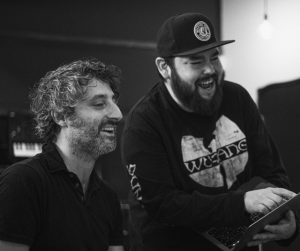Originating from Maliotenam, an Innu community on Québec’s Côte-Nord, Matiu has made a name for himself through his folk songs, ones that travel through his blood before resonating in speakers. Following a 2017 EP and a 2018 debut album, Petikat, he’s back with his sophomore effort, Tipatshimushtunan (“tell us” in Innu) where he endeavours to tell his story. Over nine songs, where Innu and French intermingle, he tells tales that are potent as a scream.

Louis-Jean Cormier, Matiu
“I rarely tell stories. Normally, I’m the type to talk about what I think of life in general,” says Matiu explains, seemingly as surprised as we are by the direction he’s taken. “Now, I’m telling stories, and that’s something new.”
Produced by Louis-Jean Cormier, Tipatshimushtunan allowed Matiu to try new things outside of the “guy-with-guitar” realm in which he was firmly rooted. “Just before going in the studio, I broke my thumb and couldn’t play guitar,” he says. “Louis-Jean took care of the guitars, and I think there’s a reason for everything. He’s from Sept-Îles, and I figured we’d connect easily because of that, and we did.”
The discoveries didn’t stop there. “In the studio, there were all kinds of keyboards that I’d never seen before,” says Matiu, laughing. “We had no choice but to try all kinds of things.” His good friend and pianist Alexis Dumais had a blast with everything he could get his hands on. Marco Dionne (drums), Mathieu Désy (acoustic bass), and Alex Métivier (sound effects and backing vocals) rounded out the troupe.
For musicians from Indigenous communities, an identity quest is a necessary passage that’s always very moving. “Trying to make sense of things when your language is about to disappear with your own generation will never be an outdated consideration,” says Matiu solemnly. He repeatedly mentions the notion of being “torn apart” between the desire to know his own culture and roots, and being integrated in society. “I want to live on the woods like my ancestors, but I also know I need to pay my bills and put bread on the table,” he says. “That dilemma is painfully true for Indigenous people.”
The album’s title track was also made into a documentary music video centred around residential schools. “I’ll never be the spokesperson for the Innu,” Matiu readily admits. “There’s way too many stories to tell, and I’m only one person with one experience.”
But the most moving song on the album is “4 flasheurs,” the story of a man driving around looking for his sister. “I really wanted to talk about all the Indigenous women that are murdered or have disappeared,” he says. “I didn’t live through that, but I know people who did. I wanted to put myself in the shoes of a guy whose big sister has disappeared, leaving behind a kid that’s sitting on the back seat.” The image of a slow-moving vehicle with its hazards on was the starting point of the story, a striking image that summarizes the whole story. “That song truly took me out of my comfort zone. If you close your eyes, it’s almost like a movie,” he adds.
As for his live show, Matiu wants to give himself the latitude to explore any avenue afforded by his new songs. “It’s a trip, we dance, and we jam,” he says with joy. “Sometimes it’s on a more punk-rock tip, other times it’s just me and my guitar, like on that song for my mom (“Mom”). “Nos belles chansons,” when you listen to it, feels like being in a runaway train. I’ve always joked I make bi-polar folk. These days, I’m even more all over the place.”
While re-telling the recording process, Matiu reminisces about Louis-Jean Cormier’s biggest challenge: “Respecting my influences,” he confides. “My generation is already in trouble. If we don’t share our own culture with each other, it’s too late. From the time I was born until I went to school, I only spoke Innu. I didn’t understand anything at school, and I’d come home crying. One day, at lunch, I tried saying ‘fork’ (‘fourchette’), but I never managed to get one. Then my parents started speaking French with us at home. Innu came back into my life later on, when I wanted to speak and sing it.”
Matiu doesn’t think all Indigenous languages are dead, but they’re definitely been told it’s “last call.” Thankfully, and he’s adamant about it, all doors are wide open for artists who wish to sing about their roots. “We’re invited to festivals and to perform for wide audiences and our stories are passed on,” he says. “We’re being heard.” There are, indeed, languages that will always have a story to tell.